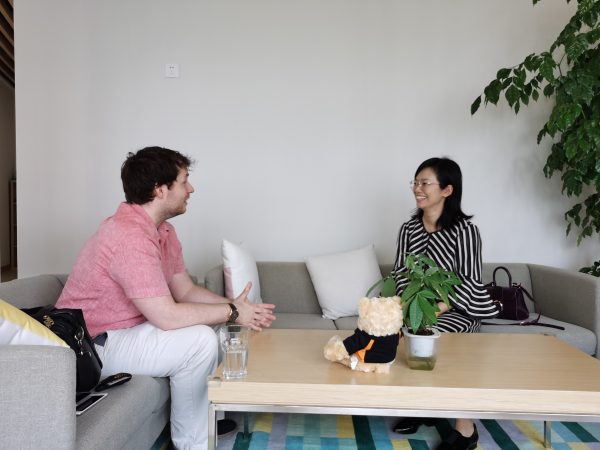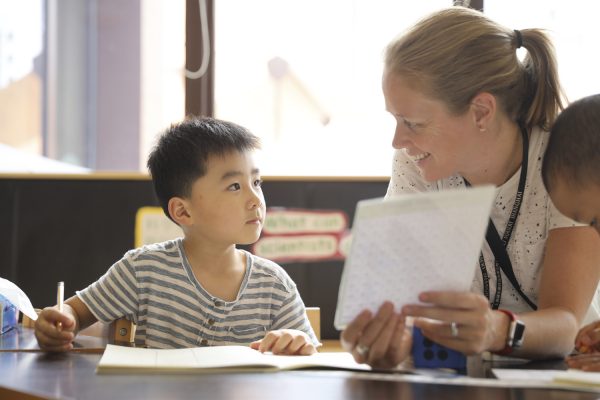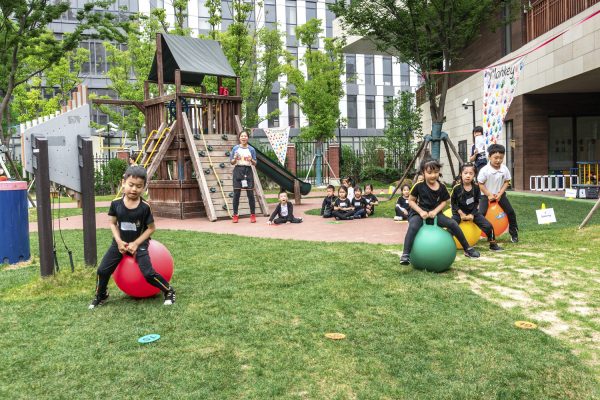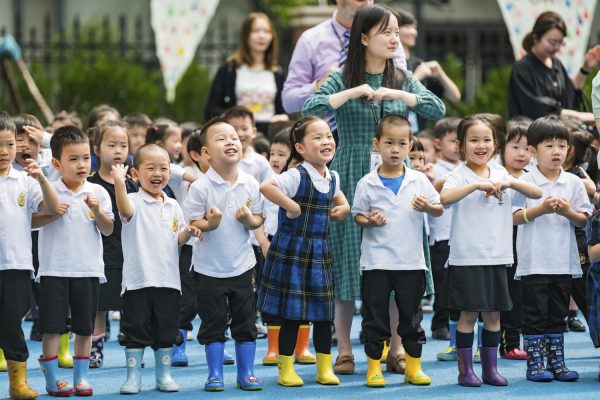
Clarissa Xu is one of many parents who have children attending both Hiba School and Hiba Nursery.

Clarissa’s son William is currently in grade 2 at Hiba School after enjoying his time at the old nursery site, while her daughter Melody is three years old and began attending Hiba Nursery one month ago.
Q: What made you decide that Hiba was the right choice of school for your son William and, later on, your daughter Melody?
I studied at Nottingham Ningbo China University, so I was already personally aware of the benefits of a bilingual education. I valued my experiences there very highly, so I knew that a bilingual education environment was something I wanted for my own children, to give them a wider sense of perspective in many things, such as an appreciation of different languages, cultures and different ways of thinking. Of course, I had heard of the Wellington/Hiba brand, given that it has an excellent reputation in China and specifically here in Shanghai. What really attracted me to Hiba was the fact that it brings together very professional teachers from China and many other countries. I genuinely felt that my children would get the best of both the Chinese and international school curriculums this way, because the teachers form such a good team here. After a little research and a visit, I was very impressed by how carefully they had crafted their curriculum and how passionate they were about teaching it.

Q: What were your first impressions of the new Hiba Nursery when it was time for your daughter to attend here?
I remember being very impressed by the brand-new facilities and the professional teachers. Essentially, I thought that it looked exactly as a nursery should: bright, colourful, inviting and exciting – everything that a young child needs when they are just getting used to the idea of formal education. The little things made a big difference too. I liked the use of natural materials – wooden desks and chairs, the playground equipment outside, everything was of such high quality and that made me feel safe to bring my child here.

Q: What was Melody’s first day like?
She was a little bit nervous, of course! That’s to be expected, but she was so curious too. I remember how her eyes were busily darting around, looking everywhere, at the teachers, the other children, the play areas – there was a lot for her to take in! Still, I was so happy to see how quickly she settled in. Even on the first day she found a favourite place – she loved the roleplay area where she could pretend to be at the supermarket. It was very reassuring for me to see her getting involved so quickly and enthusiastically. Now that she has been here for a month, she is entirely settled. Her teacher frequently tells me how she is always laughing and happy in everything she does.
Q: What do you think of the teachers in general?
It was immediately apparent that Hiba works hard to find the best teachers who genuinely care about the children they teach. The first day when we arrived, the teachers did everything they could to make the children feel comfortable and happy. Equally importantly, they immediately started to get to know and understand each of the pupils in their care. I remember how they would observe the children, talk to them, ask them questions and make them feel safe and included. After only an hour of contact time, the teacher was able to talk to me about their observations on Melody’s habits, character and her general attitude towards school. I was extremely impressed how Hiba teachers could grasp the main characteristics and subsequent educational needs of their pupils in such a short time. I thought it was amazing, and I remember thinking to myself: “These teachers are people who will understand my child, will take good care of them and will do a great job of educating them.”
Q: When you drop off Melody in the morning and pick her up in the afternoon, what is the atmosphere like? Is there a good sense of community?
Every day I see a lot of parents dropping off and picking up their children, which is different to a lot of nurseries in China because it is more usual for this to be done by the grandparents or ayis. I think that this is an important part of what makes Hiba Nursery work well, as the parents are more directly involved with their children’s education and general wellbeing. It’s a special time of day for us parents, as we get the chance to briefly speak with one another, share stories and updates about how our children are progressing and so on. It’s also a good chance for us to touch bases with the teachers, to discuss any problems or milestones and generally get a sense of how things are going with our children. Every day there’s a really good atmosphere and I think it helps us all feel like we’re part of the same team or family.
Q: Is being part of the Hiba community important to you? Do you think it’s important to your children’s education?
I absolutely do. Building a community is a great way to make teachers and parents work well as a partnership. When we all share the same values, it’s easier for us to decide on the best direction for our children’s education. I feel lucky because we have very efficient communication channels with the nursery; it’s easy for me to get in contact and share my opinions or any concerns I might have with the teachers. The frequent parent sessions and themed events are fantastic for allowing us to all come together and get to know each other better. I’m a big believer in the idea that getting to know people in different contexts helps improve your ability to communicate with them. Educating children is not solely the obligation of the nursery, it’s a partnership and we all need to play our part, so getting to know each other well is the best way to do that.
Q: How is the bilingual nature of the nursery working for your daughter? Is Melody enjoying learning in two languages?
She is enjoying it very much indeed! We mostly speak to her in Chinese at home but it’s clear that she loves to learn new English words. Whenever I am practising English with her older brother William, she is always curious and wants to join in. “What are you talking about?” she will always ask me! It’s so lovely to see her acting in this intellectually curious way, as she always wants to learn more. I give much of the credit for her attitude to her teachers; they do everything they can to foster creativity and curiosity in all their pupils and it clearly shows.
Q: What would you say is the greatest strength of Hiba Nursery in the way it educates its pupils?
I think that would be its ability to make children excited about learning. All children are naturally very curious and eager to explore the world, but their teachers need to constantly encourage this attitude and feed their appetite for learning. Hiba teachers don’t just give pupils knowledge, they give them the tools to go out and ask questions and solve problems on their own; this is such an important ability and it needs to be reinforced as early on as possible. Children grow up, and when they do, they need to be able to actively figure out how the world works because not all of the answers will be directly given to them. I think that learning is a life-long activity, so children need to have the right foundation of abilities to learn well from the beginning. Hiba clearly believes this too, and its teachers do a fantastic job of supporting this kind of growth in their pupils.
